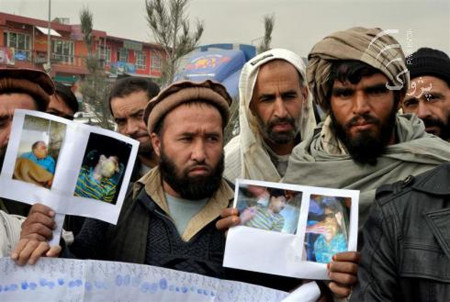By Humayoon Wahdat
Human smuggling to Iran has put many undocumented immigrants from border villages in Afghanistan at risk. The bodies of 172 youth have been brought to Kelefgan.
Residents of Kelefgan district in Takhar province say many of their relatives have been hanged in Iran. There is not a single month in which the bodies of two or three young men have not been brought to the district for burial.
Family members say human traffickers charge hefty fees to take people across the border. But once they cross the border they are just dumped. Many get caught up in illegal activities, and are arrested by the police, and end up in prison. Some rot in prison for years, others are hanged.
Mullah Mohammad Yusuf is a resident of Kelefgan. Seated on a rug spread on the ground in his home, he says he got the news that his son was hanged four months ago. "They hanged my elder son after two years of imprisonment," he says.
He explains that his son was married to an Iranian national. "He would call me on the phone (from prison). He said he would soon be released. He said, 'I will bring your grandchildren also to Afghanistan.' But I have got to know that he was hanged. They did not give me his body either," says Yusuf.

More than a hundred people rallied in Kabul against the execution of death-row Afghans in Iranian jails on Dec. 1, 2011, asking the neighbouring country to immediately release the bodies to the victims' relatives. (Photo: PAN)
Another son of Yusuf's is also in an Iranian jail. "Kamaludin is passing tough days and nights in prison. He is concerned that he may also be hanged," says the father.
Yusuf says he sent Kamaludin, 35, to Iran "eight and a half years back" to earn money for his dowry. "I got him engaged (to marry). To earn dowry he went to Iran, but he landed up in jail. His fiancée remains in her father's house," he adds.
The anxious father who blames the government for his son's death, says he has "knocked on the doors" of Members of Parliament (MPs), ministers and government officials but it has been in vain. "Now I have made my passport. I am going to Iran to see the grave of one son, and to see the other in jail," he says.
Official apathy
Last year in April, Iran and Afghanistan had signed an agreement on the exchange of prisoners (Afghans pawn in Iran relations with West, Killid 415). Janan Musazai, the Ministry of Foreign Affairs spokesman, had said the agreement allowed prisoners to spend the rest of their imprisonment, which has to be longer than six months, in their own country should they or their relatives so wish.
Yet, the hangings of Afghan prisoners, some of them first time offenders, have not stopped. There were protests in Herat province in February this year by relatives against the hangings. Protestors blocked the main highway between Herat City and Islam Qala for four hours urging the authorities to get the bodies of 13 executed prisoners from their district. (Kabul under pressure on Afghan prisoners, Killid 557).
Meanwhile, in Takhar's Kelefgan district a village elder, Shamsul Rahman, took Killid's reporter to the graveyard to show the fresh graves of youths hanged in Iran. "This new grave is of Naqibullah, we buried him just yesterday. He was in jail for seven or eight years. He was sentenced to death on the charge of smuggling," he said.
Rahman says at least two or three youth are buried every month. "Iran has hanged about 100 from our district, but no one has asked about it," he says.
The AIHRC's Hayatullah Amiri who is in charge of the north-east zone, says the bodies of 172 youth have been brought to Kelefgan.



